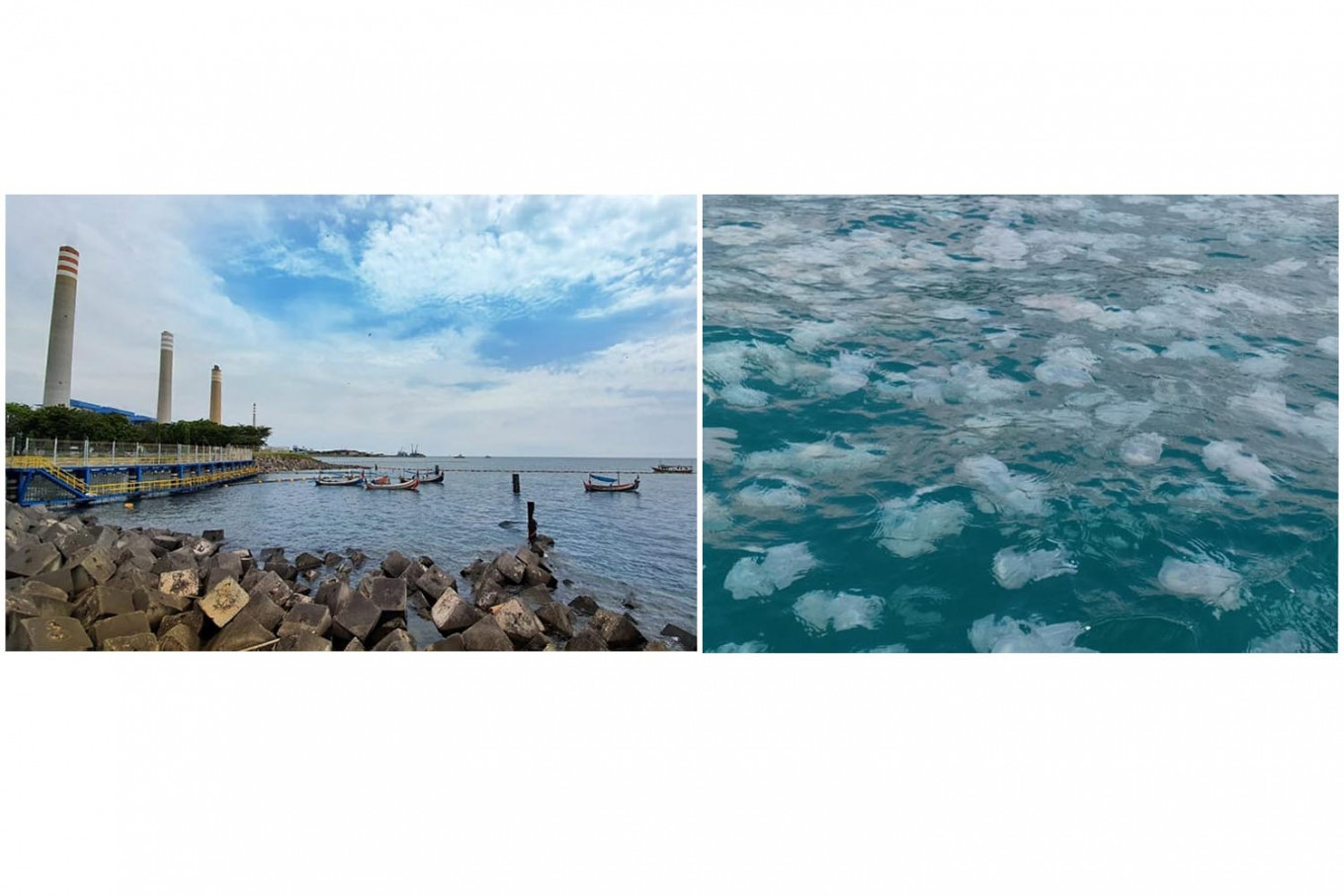Popular Reads
Top Results
Can't find what you're looking for?
View all search resultsPopular Reads
Top Results
Can't find what you're looking for?
View all search resultsDozens scramble to fend off jellyfish bloom along 70-km coastline near Paiton power plant
The sea creatures, which have been thronging nearshore waters since last week, were seen along a 70 kilometer stretch of coastline in Probolinggo and Situbondo regencies on Friday.
Change text size
Gift Premium Articles
to Anyone
 Nets are placed in front of the water intake system of the Paiton coal-fired power plant in East Java to prevent swarms of jellyfish from getting sucked in (left).
Thousands of jellyfish swarm the waters near the Paiton coal-fired power plant on Saturday. The plant's operator, PLN, said on Wednesday that the jellyfish likely migrated from colder waters near Australia (right).
(PLN/PLN)
Nets are placed in front of the water intake system of the Paiton coal-fired power plant in East Java to prevent swarms of jellyfish from getting sucked in (left).
Thousands of jellyfish swarm the waters near the Paiton coal-fired power plant on Saturday. The plant's operator, PLN, said on Wednesday that the jellyfish likely migrated from colder waters near Australia (right).
(PLN/PLN)
E
mployees of the Paiton coal-fired power plant and local fishermen in Probolinggo, East Java, have been rushing over the past few days to catch millions of jellyfish swarming the waters alongside the power plant and release them safely further into the ocean.
The sea creatures, which have been thronging nearshore waters since last week, were seen along a 70 kilometer stretch of coastline in Probolinggo and Stiubondo regencies on Friday.
More than 40 technicians from PT Pembangkitan Jawa Bali (PJB), the subsidiary of state-owned electricity firm PLN that operates the facility, and 20 fishermen worked together to install three layers of nets in the area to prevent jellyfish from entering the facility's water intake canal and water pumps.
"Based on our observations, the swarms of jellyfish have been seen from Grati beach in Probolinggo to Banyu Glugur beach in Situbondo. There are more of them now than when they first started swarming here about six days ago." PT PJB head of stakeholder management Wildan Doddy told The Jakarta Post on Friday. “We're still trying to remove them [from the canals]."
Mustofa Abdullah, the PJB general manager for units 1 and 2 of the plant, said that the three layers of nets consisted of a 300-meter-long fishing net set up in the canal entrance as the first layer, a second fishing net near the water pumps and a third in front of the water intake machines. The nets sought to prevent jellyfish from getting sucked into the power plant’s machinery.
Wildan said jellyfish caught in the nets were released into open waters at night.
"We're a little bit overwhelmed since the appearance of the jellyfish swarm is unpredictable. They usually disappear during the day, but they throng again to the surface at night," Wildan said, "Sometimes there are only a few of them, but at other times there are so many they almost cover the whole surface [of the water]."
This is not the first time the phenomenon has occurred at the Paiton plant, one of the largest coal plants in Southeast Asia. There was similar occurrence in 2016, Mustofa said.
"Since we experienced it in 2016, we have prepared necessary measures to handle the swarms," he said.
Tanjung Perak Meteorology, Climatology and Geophysics Agency (BMKG) head Taufik Hermawan said the salinity of the seawater and the onshore breeze might have contributed to the phenomenon.
Rosek Nursahid, an animal observer from ProFauna Indonesia, said further study was necessary to determine the exact cause of the jellyfish swarm near the power plant.
"My ProFauna colleagues said [the phenomenon] might be caused by various factors such as temperature changes, storms, large amounts of garbage [in the ocean], which could interfere with jellyfish migration, or even the decreasing population of turtles, which are natural predators of jellyfish," Rosek said.
"But we need research to determine the exact cause." (nal)









